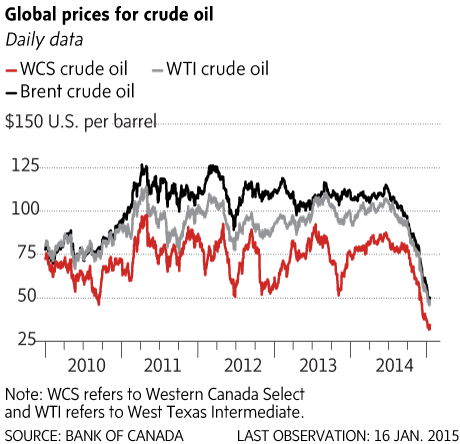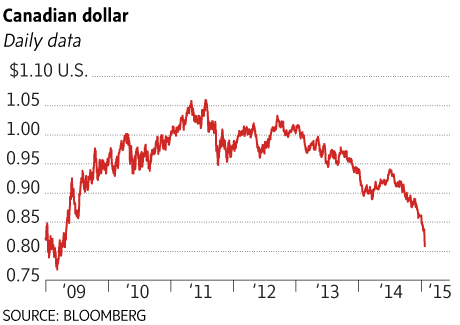The winners and losers following the Bank of Canada’s surprise rate cut
via The Globe and Mail
After weathering the recession better than many other countries, and leading the G7 economies through much of the recovery, Canada’s economy suddenly looks at risk, prompting an unexpected rate cut on Wednesday. Citing threats to Canada’s financial stability from the oil price shock, Bank of Canada Governor Stephen Poloz cut its key rate by 25 basis points to 0.75 per cent. Here are some of the winners and losers from the surprise move.
Homeowners
The most commonly cited catalyst for a correction in Canadian home values has been the possibility of rising interest rates, and the pressure that would put on the finances of marginal borrowers. Higher borrowing rates can reduce housing demand and put downward pressure on prices. The rate cut, which supports the continuation of ultra-low mortgage rates, at least pushes the likelihood of a large group of overextended borrowers running into trouble further out into the future.
Exporters/manufacturers
In an unlikely reversal of fortunes, the deterioration of the oil patch has translated into a sudden rise in the prospects of Canada’s manufacturing base. Lower energy prices help reduce production costs, while a falling loonie makes the country’s products more competitive on the global market. The Bank of Canada’s policy announcement further weakens the Canadian dollar, giving Canada’s exporters and manufacturers greater opportunities to sell into a resurgent U.S. economy.
Canadian stocks
Accommodative rate policy, or an extended period of low rates, has proven a boon for Canadian stocks and a windfall for many of those exposed to equities. The reduction in policy rates will further encourage risk-taking by Canadian investors, while low bond yields will keep investors searching for income in the stock market’s dividend payers. With valuations over the last six months being squeezed by the oil bust, the rate cut will provide a needed lift to Canadian stock investors. By the close of trading on Wednesday, The S&P/TSX composite index gained 1.8 per cent..
Canadian banks
The post-recession era has seen Canada’s biggest banks benefit from the willingness of Canadians to take on debt, primarily to buy property. Some analysts warned of risks to the banks if rates were to rise and usher in a phase of household deleveraging. The rate cut earns the banks some breathing room on that front, and lowers the risk of Canadian borrowers defaulting on their mortgages.
Losers:
Loonie
The rate cut automatically weakened the dollar further, and added another negative influence to the loonie’s slide. Canada’s high level of exposure to resources, combined with promising economic indicators out of the U.S., had already pushed the Canadian currency to a five-year low against the U.S. dollar. The loonie plunged more than 2 cents to a low of 80.70 cents (U.S.) on the news, and economists now see the dollar falling to as low as 77 cents.
Importers
The flipside of a weak loonie is that it makes goods purchased from other countries more expensive. Higher costs could also ultimately prompt Canadian retailers to raise prices in order to protect profit margins.
Canadian travellers
With each loonie capable of buying fewer U.S. dollars, the cost of travelling outside of Canada’s borders is getting more expensive. Similarly, cross-border Canadian shoppers will find their money doesn’t go quite as far south of the border.
Fixed-rate mortgage borrowers
A rate cut represents a signal to borrow and spend, and is for the most part friendly to debtors, except for those who chose to lock into fixed-rate mortgages. . Depending on the length of the term remaining on their mortgage contracts, they could miss out on the savings to debt-servicing costs if Canadian lenders decide to lower their mortgage rates.
Canadian banks
While lower rates could boost household borrowing, the margin, or profit, on each loan will fall. Even though the Bank of Canada cut its overnight rate by 25 basis points, allowing banks to borrow for 25 basis points cheaper, longer-term bond yields have plummeted by much more than that in the past year – and these yields determine the rates that banks charge their clients. Five-year mortgages, for instance, are priced off the 5-year Government of Canada bond, and its yield has fallen 86 basis points since September. (More on the banks' reaction: TD won't follow rate cut)
______________________________________________________________________________________________
For more information about Real Estate in West Vancouver or Real Estate in North Vancouver, please feel free to give me a call. You can be assured that no one will work harder or more professionally on your behalf than I will.
All the best,
Patrick

